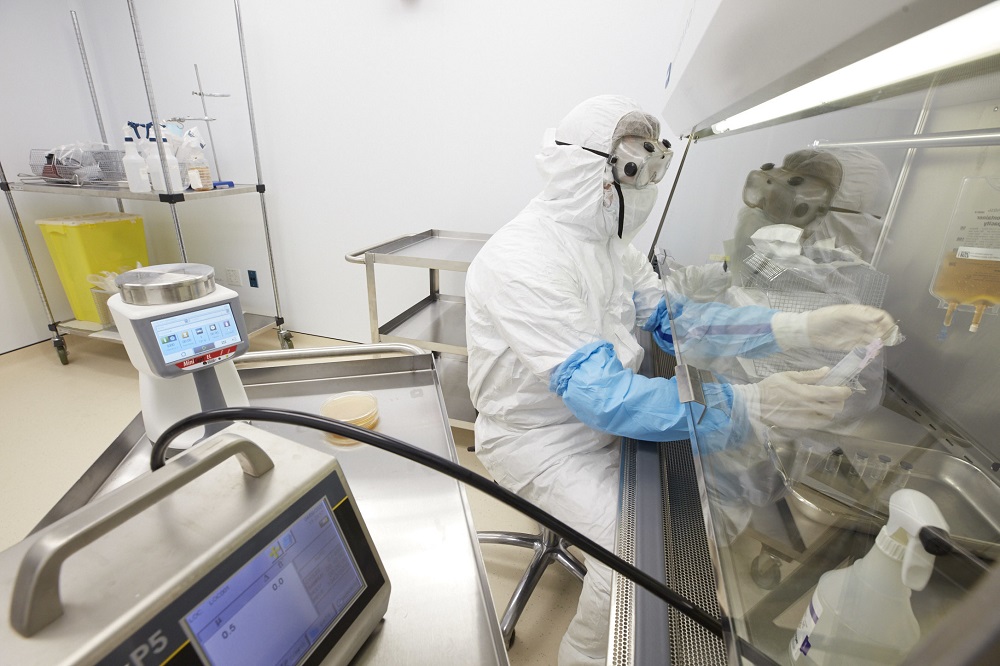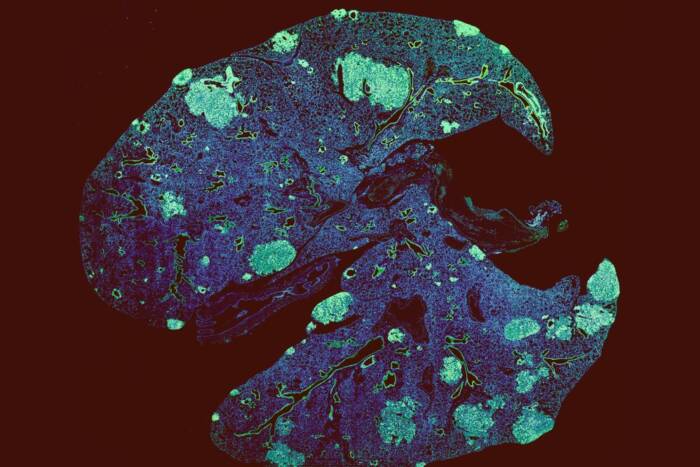A refurbished pharmacy supports research trials at Rockefeller

MacArthur in the clean room where sterile injectable drugs are prepared.
At The Rockefeller University Hospital, drugs are part of the science. They not only support patient treatment, but also drive studies that will determine the formulation of tomorrow’s medicines.
To support the roughly 160 clinical trials at The Rockefeller University Hospital each year and to meet the needs of these trials, the university’s newly upgraded pharmacy provides services to around 50 trials annually, filling thousands of prescriptions. The $1 million renovation, completed in 2020, gives the university’s pharmacists the tools they need to prepare specialized compounds, such as sterile injectable drugs, that had previously been obtained from outside vendors.
A pharmacy capable of supporting clinical trials functions much differently than the corner stores relied on for everyday prescriptions. Drugs—often experimental—are formulated and prepared for delivery on-site and on-demand, 24 hours a day, and must be transported, stored, and dispensed with unique precision. Both patient safety and research accuracy depend on it.
“Our new facility allows us to make safe trial medications that fully comply with today’s USP, FDA, and NYS standards,” says Robert B. MacArthur, the university’s director of pharmacy services who helped ensure the specificity of the renovation process. Complete with a clean room and specialized negative pressure storage to prevent staff exposure to hazardous compounds, the pharmacy now meets strict standards for drug formulation. It also gives MacArthur and his colleagues the ability to better advise researchers on issues related to drug formulation and delivery. MacArthur and his team provide research pharmacy consultation, procurement of pharmaceutical ingredients, and drug formulation and compounding throughout the drug discovery, preclinical development, and clinical trial processes.
The new pharmacy has already played a critical role in several high-profile clinical trials, including those of combination monoclonal antibody treatment for COVID-19, led by researchers in the laboratories of Michel C. Nussenzweig, Paul Bieniasz, and Charles M. Rice. “We have worked very closely with the pharmacy over the years to develop and implement procedures to deliver our investigational antibodies against HIV and have also relied on its support during our recent work with COVID-19 antibodies, which moved swiftly from bench to bedside thanks to their efforts,” says Marina Caskey, clinical director in the Nussenzweig Lab, who oversaw the COVID work with Christian Gaebler, an instructor in clinical investigation.
As on-campus COVID vaccination efforts have evolved, MacArthur and his colleagues have also stepped in to also handle the storage and delivery of the Pfizer and Moderna COVID-19 vaccines being administered to members of the community by Rockefeller’s Office of Occupational Health and Safety.
Construction on the pharmacy, located in approximately 650 square feet on the first floor of the hospital, began in June 2018 and was completed in January 2020. A team including clean room experts, HVAC engineers, and pharmacy monitoring specialists was managed by Rockefeller’s department of Plant Operations. The jewels of the new facility are the clean room, specially designed to mitigate airborne particles and allow pharmacists to handle potentially toxic products such as chemotherapeutics, and a negative pressure storage area that ensures safe containment of drugs and compounds. These improvements enable the creation of sterile and stable drugs with longer shelf lives.
“With these updates, we are well equipped to support our scientists and help ensure the success of the hospital’s mission,” says MacArthur, who has led the pharmacy since 2015.


